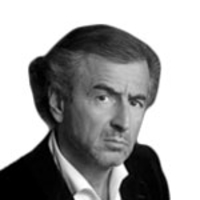Our era has to have lost its mind, its memory, or its immunity to absurdity to be surprised that an intellectual attentive to his times—committed to the defense of freedom in Libya or Syria, haunted by the barbarity of an over-the-top century that, just last week in Paris, reminded us, in the death of young gay activist Clément Méric at the hands of a French fascist group, that history is by no means done dealing out tragedy and horror in Europe—should also be interested enough in art to devote a book to it.

It may be useful to recall the definition of the word “intellectual” at the time it was coined. In the era of Zola and the first defenders of Dreyfus, an intellectual was a writer, artist, or thinker who dropped his own work, momentarily ceased his struggle with his own demons, to come to the defense of an innocent party.
Or the definition implied by Maurice Blanchot in proclaiming the same iron law, but in reverse, in a 1984 article about his activism at the time of the war in Algeria: to walk on one leg, to forget the other self who contends not with the fire of the times but with the fire of words, to allow the din of politics to drown out the painstaking articulation of literary or poetic speech—that would be “to suffer irreparable damage” and cause one “to lose forever the right to speak.”
Or the memory of Sartre in his later years penning by day the irate, angry articles demanded by his young Maoist comrades and retiring by night to an inner space in which Joyce resumed his dialogue with Freud and Tintoretto, philosophy with the novel, and the irrepressible musings of the knight-errant Pardaillan with those of the young Gustave, to work on The Family Idiot, where Sartre was the first to say that the main character, Flaubert, had been, by his silence, as responsible as the Goncourt brothers for the massacres of the Commune.
The fact is that activism cannot be a career.
And “intellectual” is not a static condition, a fact that our hurried time (which likes to lay down petty rules for its writers) tends to forget.
One is an activist and an intellectual by turns, alternately, intermittently, never a careerist at either, still less a trucker of his own indignation or of the distress of others. Rather, one is compelled, commandeered, hijacked by duty; one is pressed into service without wanting to be, indeed often regretfully; burned; bound.
Action on some days; writing on others.
Today the barricades of Baudelaire, tomorrow the recklessness of “letting words take the initiative” (a folly for which Claudel reproached Mallarmé).
Or sometimes it’s both at once (as when the wounds of the century and the oath sworn to our ancestors and our children never to let that happen again push us to create memoirs, novels, and films). In such cases the mournful echoes do not so much succeed each other as overlap in call and response, feeding off each other, shaping each other. Which, in such cases—the act or the utterance, the gesture or the text—is the palimpsest of other? Where, in the gext, is the driver and where the driven? When a writer embraces history writ large, when he leaves for Catalonia or Missolonghi, is that politics, or is literature still involved?
God knows I have embraced my times.
And God knows current events have moved me, will continue to move me, and move me each week in these columns.
But I also know that giving oneself up entirely to current events is a threat to the spirit.
I know that the “news,” the light version of communication, is like sand in an hourglass, the essence of which is simply to be noticed and not to be pondered or understood.
I know that the news is death, death itself, that of Clément Méric, that of the slaughter in Syria, the moral, spiritual death of a Western world that is not and will not lift a finger to stop the killing.
I know that there are commonalities in these murders, these massacres; these waking, walking nightmares; these frozen words, these fighting words; these paranoid, maniacal, simoniacal, proto-fascist idiocies that are the world’s stock in trade. All that is almost invariably the stuff of ugliness, violence, and disaster—the stuff of “unbeing.”
And I know that there is another, contrary commonality in all of the practices that we continue, to this day, to lump together under the banner of art, even when they grapple with negativity, evil, the dark and damned side of our species and its history. And that commonality is that those practices all are on the side of being or of what I call counterbeing or, in one way or another, of life.
Time and countertime.
To array oneself on the side of death and its accumulation of despair and hopelessness, or to stand on the side of life and the inner hopefulness that is always present in the work of the artist.
To allow oneself to be trapped in the suffocating grip of events, or, through art, which, like the Law that philosopher Emmanuel Levinas believed to be always holier than himself, to break that lethal grip.
That is the challenge for today’s writers and philosophers; those are the stakes for those who would at least try to make the leap from the ranks of the nihilists—including, of course, those nihilists who lurk within contemporary art.
Translated by Steven B. Kennedy






